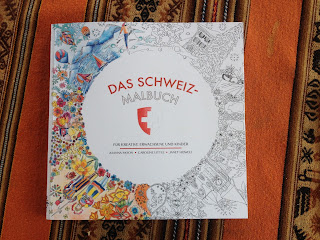It finally arrived! When the Big Swiss Coloring Book came out last year I knew I wanted to have it! Drawing has always been a great way for me to relax and focus on something entirely different for a while but lately I haven't had the time to start a project of my own (except for drawing animals for my son). A coloring book seemed like a great alternative, especially a coloring book full of drawings from my home country Switzerland that after all I do miss sometimes here in Peru.
When my mother booked flight tickets to come visit here, I just had to add this book to her shopping list and so it arrived here in Cocachimba, in the north of Peru, last week. The variety of drawings in it is even greater than what I've thought. Despite not having much free time these days I reserved some time to start coloring - just to see how it goes. I started with the very first picture, the hot air balloons.
Other Swiss inspired drawings are also available on the web (e.g. this bird and flower drawing) if you want to find out if you like grown up coloring (or want to give your children an idea for a coloring project). If you like coloring then I highly recommend you buy the whole book or its smaller version whose drawings you can mail as postcards!
© 2017 IRENE WYRSCH "A HUMOROUS GUIDE TO SWITZERLAND" ALL RIGHTS RESERVED





Comments
Post a Comment
You have something to add or would like to ask a question? I would love to hear from you!